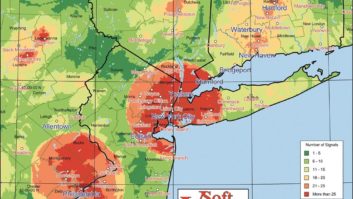
Twenty-two public comments have been filed at the FCC so far in response to the ambitious “Radio Rescue Petition” filed this summer by the Minority Media Telecommunications Council.
Initial comments were due last Friday.
The group wants the FCC to set up an “AM transition federal advisory committee,” modify AM nighttime coverage rules, replace the minimum efficiency standard for AMs with a minimum radiation standard, tweak certain FM classes in Zones I and IA, create a new “L” class of LPFMs and relax main studio rules.
It also wants the FCC to extend the three-year period for new CPs, look into a new radio agreement with Cuba, hold tutorials on radio engineering rules, create a “broadcast public engineer” position to help small businesses and nonprofits and make other changes.
Check out the 17 proposals to revise or dump what MMTC calls “archaic” technical rules here.
The most strident responses are those in regards to re-purposing TV analog Channels 5 and 6 for radio, proposals made by other groups and an issue MMTC supports.
LPTV groups Island Broadcasting and the Association of Maximum Service Television, as well as ABC and NAB, oppose this proposal. NAB said it agrees with MSTV, which said the proposal “ignores the fact that hundreds of television stations — including full-power stations and Class A, low-power television stations, and translator stations — already operate on these channels.” NAB also said “the envisioned reallocation of TV Channels 5 and 6 for radio service could cause significant disruption to post-transition digital television service.” It supports many of the MMTC’s proposals and says the FCC should concentrate on the ones that don’t disrupt DTV service.
Island Broadcasting, licensee of low-power TV station WNYZ in New York, called the proposal “unwise and unwarranted” while ABC TV called the issue moot because the FCC has said the continued use of Channels 5 and 6 for television service is in the public interest.
Broadcast engineer Dana Puopolo supported the idea, saying about 30 TV stations are using these channels, “all of which could easily be migrated elsewhere,” allowing “thousands” FM allotments to be created. AMs that would like to move to those FM frequencies should be given preference to move after a “reasonable period” of simulcasting, and after that those owners should give up their AM frequency, he writes.
So did a number of smaller broadcasters filing jointly, like Multicultural Radio.
Of course TV would be reluctant to give up any of this spectrum. However that doesn’t mean that none of this spectrum shouldn’t be re-purposed for radio. It’s interesting that one of the proposals called for the FCC to start giving AMs the attention the agency now gives LPFMs, and give the AM service some help — including being allowed to migrate to a new, expanded FM band.










